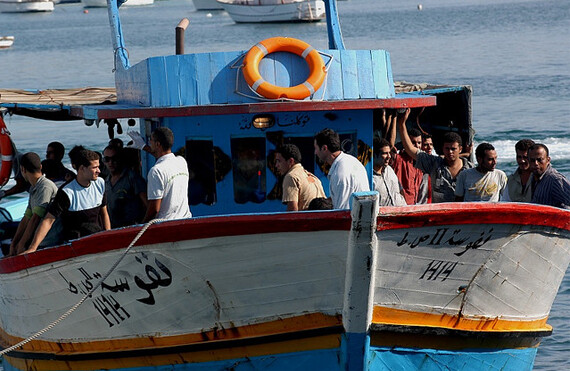Thousands of illegal immigrants and asylum seekers are detained throughout Europe, and aid organizations report deplorable living conditions and inhumane treatment at the facilities where they are held. Are there positive alternatives to detention in the effort to manage illegal immigration? Much of the research on migration policy concludes that democratic nations have little real capacity to control illegal immigration. What effect does detention have?
In 2008, the European Parliament adopted the Return Directive on treatment and repatriation of illegal immigrants, allowing states to detain illegal immigrants for up to 18 months. The purpose of the legislation was to create an EU-wide framework for rules and procedures on the return of illegals, but it has also helped legitimize the use of detention as a method to combat the unauthorized movement of people. Weak legal protection for non-European citizens enables deprivations of freedom that would be unthinkable against European citizens.
Among the paperless, asylum seekers are granted international legal protection under the Refugee Convention Relating to the Status of Refugees [PDF], which defines refugees and sets standards for their protection, while a European Commission directive [PDF] regulates minimum standards for housing, education, health care, and access to an interpreter when necessary. As countries have adopted tougher policies, a growing number of refugees and asylum seekers who enter the country without valid travel documents are also being detained. Despite the EU legal framework, in reality there is little action international regimes or EU authorities can take if member states infringe upon regulations.
Very few applicants meet the requirements for refugee status. Those who do not can end up working and living in an ambiguous state, paradoxically hidden and excluded from the public yet exposed and vulnerable to discrimination and deportation.
Malta in particular has been criticized for appalling living conditions at the island's detention camps. Doctors Without Borders published a report [PDF] last year detailing men, women, and children jammed together in overcrowded cells. Healthy people were placed in the same areas as those suffering from contagious illnesses, leading to the spread of chickenpox and tuberculosis. Most shelters had broken windows, no heating or ventilation systems, and insufficient or non-functional toilets and showers. Access to outdoor areas was limited and only allowed at the discretion of the guards.
The term "camp" can be misleading when labeling these facilities—detention takes on different characteristics depending on the jurisdiction. Confinement varies from the use of regular prisons and holding cells to camp-like places with makeshift buildings, barbed wire, and bars.
Detention takes place all over Europe [PDF] and, like the case of Malta, standards often don't comply with the EU directive. Belgium, France, and Greece have been criticized for practices such as detention of children, unacceptable living conditions, and the deflection of rights. The UK has not opted for the EU directive and can choose to detain people as long as it desires, though it does have guidelines against confining asylum seekers who are torture victims. Aid organizations counter that torture victims are detained and that the government deliberately ignores their reports.
Italian Prime Minister Silvio Berlusconi won election in 2008 primarily on anti-immigration politics. In line with his electoral promises he introduced the so-called Security Package [PDF], expanding the number of detention facilities that hold foreigners for deportation, rechristening them as Centers of Identification and Expulsion (CIE).
In 2009, Doctors Without Borders visited 21 Italian detention centers as a follow-up to a report it conducted in 2004. The second report [PDF] concludes that conditions have not improved much despite many centers operating for more than a decade. The CIEs hold anyone without a residence permit, meaning that the centers end up accommodating people with various legal statuses—from newly arrived asylum seekers to foreigners who were apprehended after living locally for many years, sometimes with homes and families. The report documents self-mutilation, attempted suicides, suicides, rioting, drug addiction, mental illness, and inadequate healthcare and legal advice.
The CIE on the island of Lampedusa hosts asylum seekers and illegal immigrants who have arrived by boat from Africa. It is built to manage 850 people, yet when a riot broke out in January 2009 the camp had more than 1,800 detainees. They busted open the gates and marched to the town hall to protest their treatment. Even Berlusconi has acknowledged that the centers are "very similar to a concentration camp."
In accordance with the intensified measures against illegal immigration, the Italian government allotted €3 million for detention in 2008 and increased the number of spaces in the CIEs to 4,640. Another €37.5 million per year for 2009 and 2010 was earmarked for creation and management of new facilities. Considering that Italy has 300,000 registered illegal immigrants, and an estimated 650,000 [PDF] in total, the cost seems wasted on managing such an arbitrarily small percentage of the overall situation.
Similarly, a 2007 report [PDF] by the Information Centre about Asylum and Refugees states that UK detention centers accommodate approximately 2,700 people, with the weekly cost per detainee ranging from £511 to £1,620 depending on the facility. The UK government estimates the number of undocumented immigrants at somewhere between 310,000 and 570,000 [PDF]. The total amount of money spent on detention around Europe is unknown, but country-specific statistics indicate that costs are quite significant.
The ineffectiveness of detention as a means to control illegal immigration is well demonstrated by data from the United Kingdom and Italy. The financial costs of confining a relatively small population combined with the human costs in mental and physical health point to detention as both morally deficient and economically inefficient. For example, one of the unintended consequences of restrictive European migration policies has been the very lucrative business of human smuggling. Detention seems to have more of a symbolic importance than a real effect. It infuses the population with a sense that the government can act against those it deems unwanted.
Migration policy scholars argue that democratic nations are very limited in their ability to control migration. They contend that a wide gap [PDF] exists between the goals and outcomes of national immigration policies—a gap that is growing in industrialized democracies. Explanations for this gap lie in the social dynamics of migration, globalization, and the North-South relationship. National political systems can also be responsible for policy failures due to conflicts of interests and hidden agendas among politicians.
Ironically, restrictive migration policies seem to produce illegality as they decrease the flow of migrants. It is well documented that many European countries have a structural demand for labor within low-paid work sectors such as agriculture, construction, and the household market. Most economic migrants prefer to stay temporarily, but when entry or reentry becomes difficult they prefer to settle down. Hence, the illegal population increases.
While a punitive detention system aims to deter people from making the hazardous trip to Europe, demographic numbers in Europe point to a need for immigration. Aging populations and low fertility rates have put the social security system in crisis and future labor immigration will be essential to keep living standards at the same level. Many of the detained are young men and women who have come to Europe to look for work. Thus the system locks up potentially valuable assets for the European labor market.
These gaps and paradoxes show the need for a policy breakthrough that can benefit host countries as well as immigrants. Yet while good institutional conditions exist at the EU level with its common framework to manage labor immigration and asylum seekers, the situation has been undermined by xenophobia and anti-immigration politics at the national level.
As migration scholar Stephen Castles points out, migration patterns are complex [PDF] and in order to create successful policies we need to broaden our understanding of this complexity. In order to target both economic and forced migration, the inequality between North and South needs to be addressed through development, trade, and conflict prevention. Likewise, there is a need to understand the importance of the role of family reunification and community formation in the host countries, as well as the migrant networks that assist in the search for work and housing. These factors suggest that detention can never have more than a marginal influence on migration.
Migration is restricted and opportunities constrained today by the type of passport one carries. Throughout history people have always had the possibility of leaving their homes in search for a better life. A debate on whether we, as human beings, have a fundamental right to move is of current relevance. At the moment it may be unrealistic to demand open borders, but as more illiberal methods are used to control immigration the question will become more pertinent.




